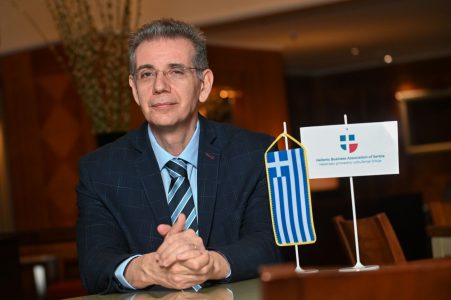The overall relations between the two countries today show a high degree of diplomatic, economic and diverse cultural cooperation.

Greece and Serbia are two countries whose peoples respect and love each other incredibly much. Diplomatic relations between these countries have lasted for 140 years, and the Hellenic Business Association (HBA) in Serbia has been working intensively on bringing the Greek and Serbian markets closer and boosting economic relations between the two countries. We talked with the Chairman of the HBA’s Managing Board, Stylianos Zakof, about the economic cooperation between Serbia and Greece.
This year marks the 18th anniversary of the inception of the Hellenic Business Association. How would you rate the overall Greek-Serbian relations today?
We can confidently say that the overall relations between the two countries today, show a high degree of diplomatic, economic and diverse cultural cooperation and at the same time, reflect a historical heritage. Namely, diplomatic relations between Serbia and Greece were established more than 140 years ago, while the concept of Greek-Serbian friendship was formed during the 19th century. In the times ahead, this relationship deepened with strong humanitarian support shown by our two nations and a stable partnership at the state level, as evidenced by regular visits of the top state officials. Greece is one of the first and largest investors in Serbia, and during the past period, it has positioned itself as a strategic partner, present in almost all segments of the economy. The Hellenic Business Association was founded soon after the arrival of the first Greek investors in Serbia, and in that sense represents an image of the Greek investment presence in Serbia, namely, its diversity, perseverance but also success in facing numerous challenges and economic circumstances, both in Serbia and Greece.
The total Greek direct investments are estimated at approximately 1.5 billion euros.
How desirable is Serbia as an investment destination for Greek investors, and what are Serbia’s advantages?
Thanks to the economic reforms that were implemented in the previous period, Serbia has positioned itself as one of the most important investment destinations in Central and Eastern Europe. There are a number of important investment incentives here, including free trade agreements, which allow duty-free export to markets, a highly skilled workforce, competitive operating costs, free zones and the like. An increasing number of international companies doing business here validates the fact that Serbia has taken many steps towards creating a stable environment for the country’s economic development in recent years, which also proves that investors have recognized Serbia’s positive economic and investment climate.
In which sectors Greek companies are the most active and how can we improve the existing cooperation?
Greek companies in Serbia are competing with some of the best Serbian and foreign companies in almost all sectors. They are especially active in the hotel sector, industry, construction, oil trade, tourism, telecommunications, food and beverage retail, banking, etc. The total Greek direct investments are estimated at approximately 1.5 billion euros, while direct and indirect investments made in the last 20 years exceed 2.5 billion euros. This indicates that Greek companies will be here in the long run. There are many prospects for new investments and opportunities for further developing our economic cooperation. Areas in which we can further boost our bilateral economic cooperation and which can also reflect the future presence of Greek investments in Serbia are tourism, energy, recycling, wastewater treatment, information and communication technologies, food and beverage trade, fruit trade, construction, etc.

After 18 years of being a bridge that connects Greece and Serbia in business, which of the HBA’s results are you the proudest of?
The Hellenic Business Association was founded quite spontaneously, following the initiative of several Greek business people who in 2003, decided to establish a platform for the connection and cooperation between the members of the Greek business community. This idea was put into practice and today it functions smoothly. Thanks to the strong support of its members, the HBA promotes not only economic but also social and cultural ties between Serbia and Greece. During past years, the Association has affirmed itself as a key stakeholder in connecting the Greek and Serbian economies, which is why today it represents the interests of its members before the decision-making factors in both countries. In addition, the Association launches concrete initiatives that result in concrete benefits for our members. I am proud of the constant development of the HBA , which adapts its activities and priorities to the needs of its members and the market in the given economic circumstances.
Greece is again on a stable development path.
What is your forecast in terms of overcoming the consequences of the coronavirus pandemic on the Greek economy but also Greek companies in Serbia?
The pandemic significantly has affected the economic activity and the social and political reality of all countries, including Greece. It emerged at a time when our country was on its way out of a long-lasting crisis, and when it was able to create sufficient financial space to support companies affected by the pandemic. At the same time, the public sector has demonstrated its efficiency thanks to accelerated digitalization, but also thanks to adequate management of the health crisis. A significant number of companies have managed to adapt to the circumstances by using digital tools and adapting their products and services to the needs of the market. On the other hand, the Greek’s economy strong dependence on the service sector, tourism and hospitality, has caused great challenges. Recovery forecasts are primarily based on a shift in focus from the aforementioned sectors to industries that are more resilient to turbulent changes in the economy, such as manufacturing. Furthermore, strengthening international competitiveness and increasing exports would positively affect the country’s overall export performance, which has not yet reached its full potential. Green growth and the transition to the circular economy, continued digitalization of public administration, as well as incentive policies, would significantly contribute to this recovery too.
If we draw a parallel with Greek companies in Serbia, we can conclude that the situation does not differ much from that in Greece. The service sector, hospitality and tourism were the first to be hit, while the manufacturing sector and the inelastic demand products sector suffered slight losses. Like all other companies in Serbia, it is important to adapt to the changes and needs of the altered market, with appropriate incentive policies and cooperation between the public and private sectors at all levels in place. At the same time, I would like to mention that the Prime Minister of Greece pointed out at the 85th International Fair in Thessaloniki that Greek GDP recorded a 16.2% growth in the second quarter, which is also the highest growth in Europe. Due to such good results, and especially thanks to tourism, Greece is again on a stable development path and the previously projected growth of the Greek economy for 2021 has been revised from 3.6% to 5.9%. Thanks to such forecasts, we can expect the new Greek investors in Serbia.
Greece’s direct and indirect investments made in Serbia in the last 20 years exceed 2.5 billion euros.
What can people in Serbia learn from the Greeks and vice versa?
Due to the constant increase in the number of Serbian tourists who visit Greece every year, I have the impression that Serbs have learnt from Greeks how to include elements of Greek Mediterranean cuisine in their diet. Specifically, I mean olive oil, feta cheese, ouzo, etc., as evidenced by the increase in sales of these products. On the other hand, due to the growing number of Serbian coaches and players in all team sports in Greece, Greeks are trying to emulate their know-how and skills that make them globally successful.
After living in Serbia for 20 years, what do you like the most here and what is it that makes you feel connected to Belgrade?
After all these years, I no longer feel like a foreigner in Serbia, because I have spent almost half of my life here. Furthermore, my children grew up in Belgrade and experience it as their hometown, which I am very proud of. What sets Serbia apart from other countries are its people, namely, their sincere kindness and hospitality. In my case, these characteristics are even more pronounced, because I am Greek, and it is a well-known fact that our peoples consider each other as brothers. Additionally, Serbia has an impressive history, culture and natural attractions. Belgrade is a city that accepts and welcomes people from all over the world, has a multitude of parks, two beautiful rivers, rich cultural life and attractions. I have always liked the way Belgraders like to pamper their guests by bringing out the best food and drinks and visiting places that they will surely like, just to show the beauty of Belgrade in a hope that the guests will visit the city again. And, I must admit, I completely understand them.